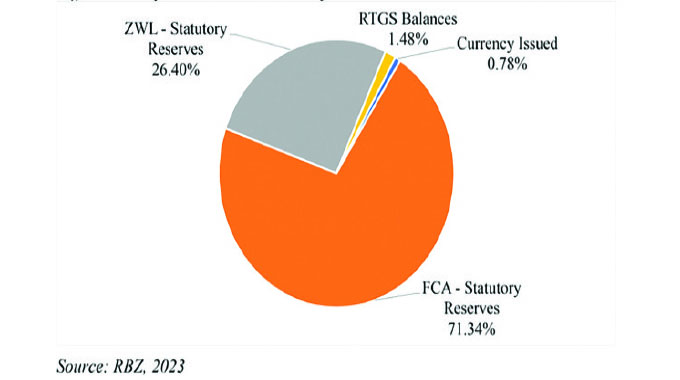Higher forex reserve ratio to help stabilise ZiG

Business Reporter
The Reserve Bank of Zimbabwe (RBZ) has adjusted the foreign currency statutory reserve ratio on demand deposits, a move analysts said would help in the sustainable management of the foreign exchange market.
The policy change resulted in an increase in the statutory reserve ratio for foreign currency demand deposits from 15 percent to 20 percent while maintaining the current level of 5 percent for foreign currency time and savings deposits.
In his 2024 monetary policy statement RBZ Governor, Dr John Mushayavanhu said, “In this regard, the bank is increasing the statutory reserve ratio for foreign currency demand deposits from 15 percent to 20 percent.
The statutory reserve requirements for foreign currency time and savings deposits shall, however, remain at the current level of 5 percent.”
The decision comes amidst persistent challenges in the foreign exchange market, marked by fluctuating exchange rates and increasing demand for foreign currency.
Mr Raymond Madziva, a prominent banker praised the central bank’s decision, stating, “The adjustment in reserve requirements for foreign currency demand deposits demonstrates the RBZ’s commitment to maintaining financial stability.
“By increasing reserves, banks will be better equipped to manage liquidity risks, safeguarding the integrity of the banking system.”
The reserve requirement serves as a tool for managing liquidity within the banking system and in economies with significant foreign currency deposits, the statutory reserve ratio for demand deposits can also influence exchange rate stability.
“Through adjusting reserve requirements for foreign currency deposits, central banks can manage liquidity in the foreign exchange market and stabilise exchange rates.
“Higher reserve requirements for foreign currency deposits can help prevent excessive speculation and volatility in currency markets,” said Mr Madziva.
As a way to protect the ZiG, the apex bank said it would ensure that up to 50 percent of the liquidated surrender forex receipts were channelled to support the forex market while retaining the balance to meet Government foreign currency needs.
The RBZ has among other things implemented strict liquidity management to smoothen liquidity shocks that cause spikes in the exchange rate.
To also prop up the ZiG, the authorities will continue fostering greater demand for the local currency through a mandatory requirement for companies to settle at least 50 percent of their tax obligations on Quarterly Payments Dates (QPDs) in ZiG.
Economic analyst Mr Namatai Maeresera highlighted the potential impact of the policy change on the broader economy.
“The central bank’s decision to raise the statutory reserve ratio for foreign currency demand deposits is a prudent measure to address imbalances in the foreign exchange market,” Mr Maeresera commented.
“By requiring banks to hold a higher proportion of reserves against these deposits, the central bank aims to curb excessive speculation and reduce the volatility often associated with foreign currency transactions.”
The adjustment in reserve requirements reflects the RBZ’s proactive approach to maintaining macroeconomic stability amidst external pressures and domestic economic challenges.
In recent years, the country has faced foreign currency shortages, which have hindered businesses’ ability to import essential goods and services, leading to inflationary pressures and supply chain disruptions.
Through implementing targeted measures to manage foreign currency demand, the apex bank aims to alleviate pressure on the local currency, enhance investor confidence, and promote sustainable economic growth.
“Such decisions underscore the importance of effective monetary policy in navigating uncertain economic conditions and fostering a conducive environment for investment and economic development,” added Mr Madziva.
While the increase in reserve requirements for foreign currency demand deposits may initially pose challenges for banks in managing liquidity, it is expected to have a positive long-term impact on the stability of the financial system.
Banks may need to adjust their liquidity management strategies and pricing models to accommodate the higher reserve ratios effectively.









Comments